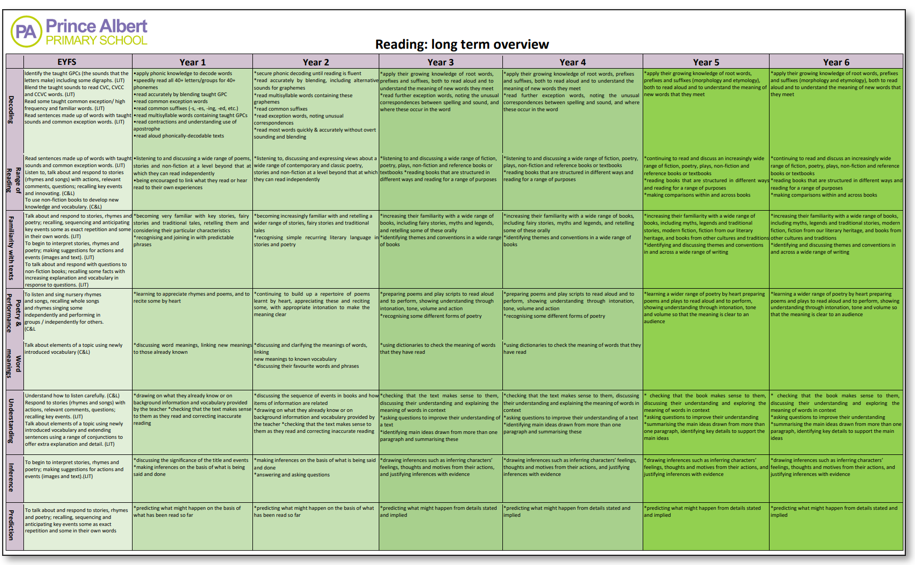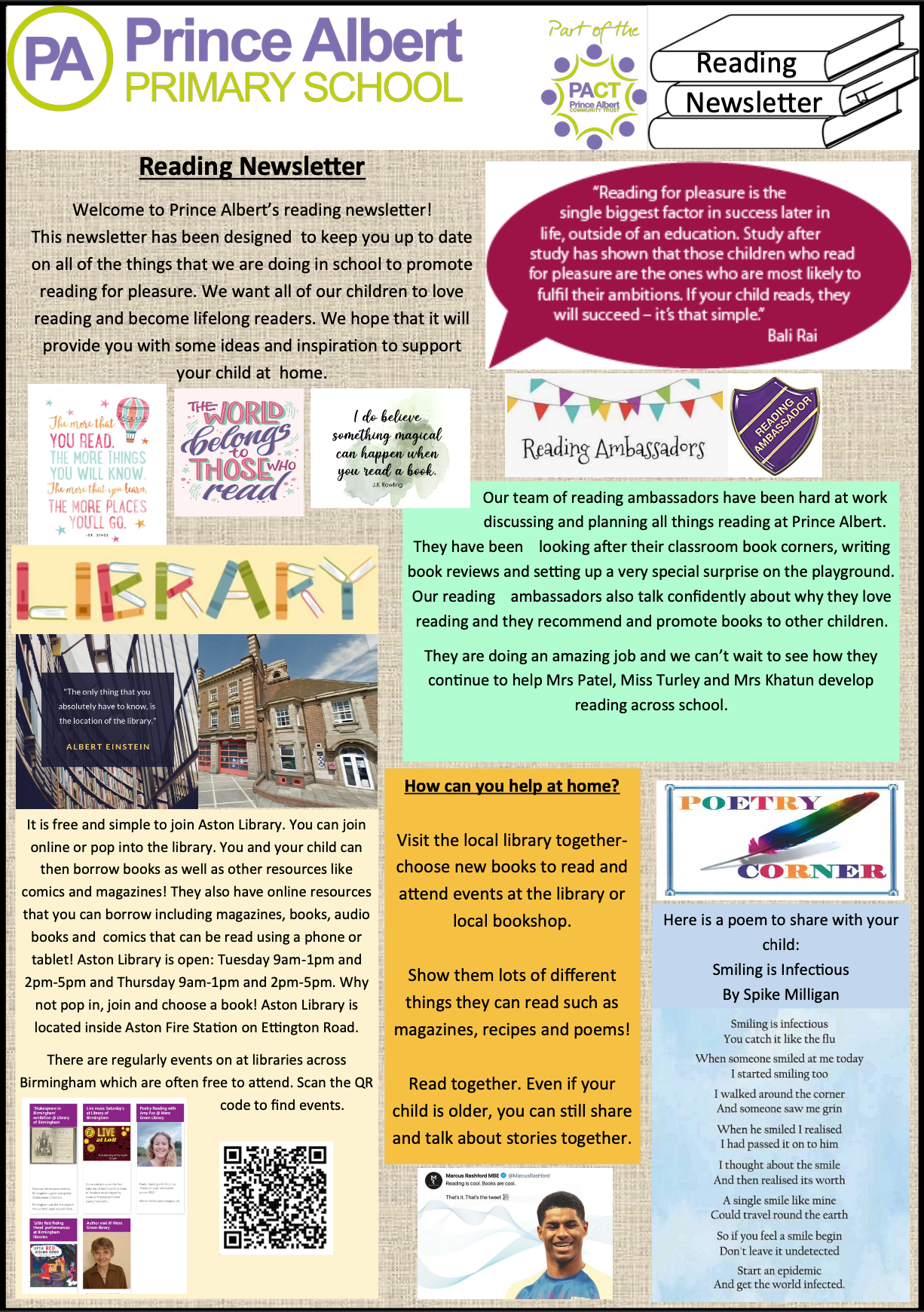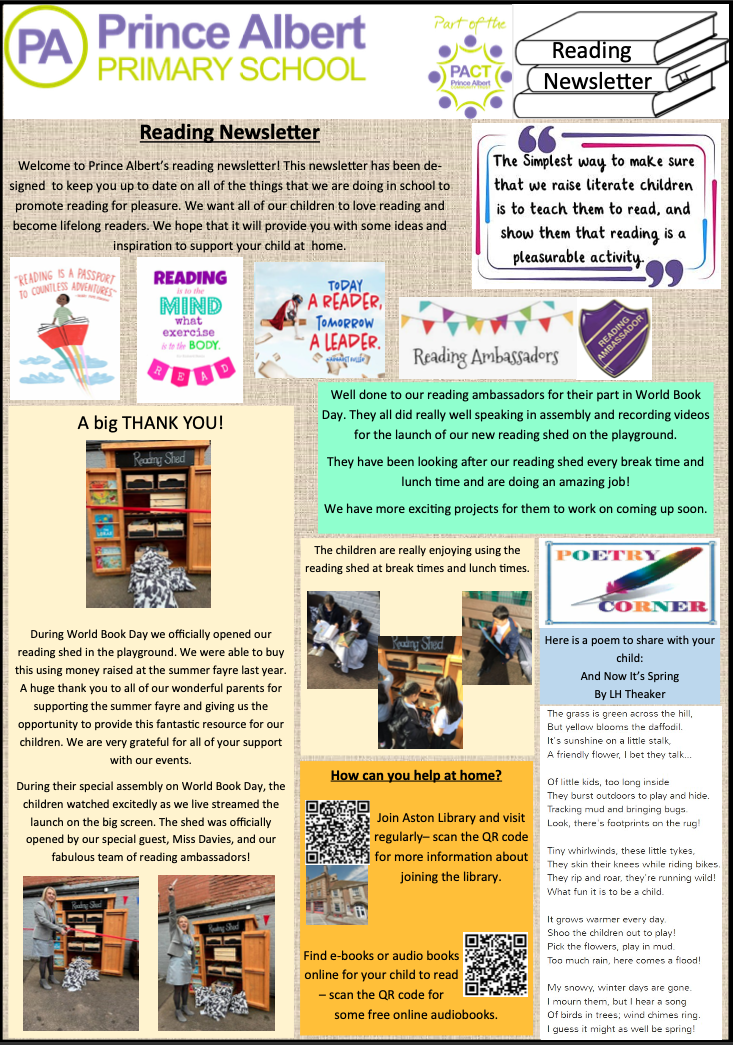READING & PHONICS
'He that loves reading has everything within his reach' - W. Godwin
INTENT
At Prince Albert, we are determined that every pupil will learn to read, regardless of background, needs or ability. Reading is at the heart of our curriculum because we want every pupil to read widely and to gain a rich knowledge of each subject across the curriculum. We want our pupils’ to become life-long readers who enjoy books and have a desire to read for pleasure. By offering a wide range of texts, we aim to broaden our pupils’ minds and experiences to allow them to empathise with the world in which they live and support the development of their cultural capital.
We aim for our pupils’ to be able to:
- read with confidence, fluency and good understanding, drawing upon a range of independent strategies to self-monitor and correct
- have an interest in a wide range of reading materials and read spontaneously for enjoyment and pleasure
- read confidently to acquire information
- acquire a wide vocabulary, an understanding of grammar and knowledge of linguistic conventions for reading
- meet age related expectations for reading, with the aspiration to exceed them
IMPLEMENTATION
PHONICS
At Prince Albert, we use the validated systematic synthetics phonics programme, ‘Essential Letters and Sounds.’ This allows our phonics teaching and learning to be progressive from EYFS to Year Two. Pupils in our Nursery work on Phase One phonics, which concentrates on developing their speaking and listening skills and lays the foundations for the phonic work which starts in Phase 2. As pupils move into Reception they continue to build on their listening skills and are introduced to Phase 2. They have discrete, daily phonics sessions where they revise previous learning, are taught new graphemes/phonemes, practise together and apply what they have learnt. Through the Essential Letters and Sounds programme, the pupils are taught the 44 phonemes that make up all the sounds required for reading and spelling. These phonemes include those made by just one letter and those that are made by two or more letters. Pupils work through the different phases and as they grow in confidence and experience, they are introduced to alternative ways of representing the same sound. The ’Essential Letters and Sounds’ assessment tracker is used to regularly assess the pupils’ phonics skills; teachers will identify any gaps that pupils’ may have in their reading and closely monitor interventions to ensure that these gaps are closed.
READING IN EYFS & KS1 LONG TERM OVERVIEW
Every pupil, in every class, will read with an adult, every day. Daily guided reading lessons are structured to allow pupils to develop as competent readers who can discuss and record their level of understanding of the texts read. Pupils will focus on applying their phonic knowledge to their reading. They will have a fully decodable reading book that matches their phonic level to ensure that they can gain an appropriate level of fluency. Our pupils will take home a fully decodable book every week and they will also have access to the Oxford Owls fully decodable E Book library where they will have the opportunity to consolidate and read books with the sounds that they have been taught.
From Year 2 onwards and where pupils are reading fluently, reading lessons are primarily centred around the KS1 and KS2 reading content domains, and these are shared with pupils through the acronyms E (explain the meaning of unknown words) R (retrieval) I (interpret/inference) C (choice of language) S (summarising/sequencing) P (prediction)
READING IN KS2
Where phonics is a primary focus in EYFS and KS1, in KS2 the focus is primarily on comprehension, as the expectation is that most pupils will read with an appropriate level of fluency by the end of Year 2. Pupils in KS2 read during daily whole class reading lessons and opportunities are made to read in other subjects. A carefully selected whole class text, linked to the wider curriculum is used as a stimulus to teach the key knowledge and skills required to further develop comprehension and understanding. ‘RIC’ starters are used at the beginning of each reading lesson to further embed the skills of retrieval, inference and choice of vocabulary. Pupils’ who are less fluent in reading are heard read daily and the reading speed and fluency of all pupils across the key stage is also checked each term. In addition, the ‘Project X Code’ reading intervention programme is also delivered three times a week to pupils who continue to work on decoding. This programme enables pupils to quickly catch up and read with fluency.
STRONG VOCABULARY FOCUS
High quality texts and passages are chosen in reading lessons, appropriate to the expectations of year groups or abilities of pupils. Vocabulary is explored and developed, with teachers providing opportunities to explore definitions of new words and make links between these words and known words.
ACCESS TO HIGH QUALITY TEXTS
Pupils’ have access to high-quality books that reflect the diversity of our modern world. All our classrooms have book corners, and our library is fully stocked.
ESSENTIAL STORY TIME AND OPPORTUNITIES FOR FREE READING
We recognise that to develop a lifelong love of reading, reading for pleasure should be encouraged, modelled, and celebrated. In EYFS and KS1 Pupils make use of book corners to select books to read for pleasure. In KS2, pupils are also given opportunities to read for pleasure, in which they can read books of their choosing or explore texts that their teachers have selected for them to try. This encourages pupils to make new choices. Teachers read to pupils in all classes and story time is a key part of the day. Teachers select texts from our school’s reading spine which has been designed so pupils can listen to a wide breadth of different genres and authors, whilst also developing a real love of reading.
Reading is celebrated throughout the year through national events and competitions, author visits, scholastic book clubs, after school reading clubs, library sessions and our annual ‘Take one book’ launch.
IMPACT
Progress is closely monitored by the subject leader and the senior leadership team through regular school monitoring activities. This is then used to inform next steps for pupils, staff development and the implementation of reading across the school.
Pupils’ leave Prince Albert Primary School as confident, competent readers who can read fluently and with good understanding. Pupils’ read for pleasure and have a real love of reading a wide range of texts. They are equipped with a secure understanding of a range of vocabulary and reading strategies. This is demonstrated by pupils being assessed as meeting and exceeding age-related expectations and having a good knowledge of a range of literature and authors.
Audio books to listern to with your children:
 Click the image above to access the World Stories website.
Click the image above to access the World Stories website.
Reading Newsletter Issue 1
Click image to read full reading newsletter
Reading Newsletter Issue 2
Click image to read full reading newsletter



